专业英语Introduction
- 格式:ppt
- 大小:182.50 KB
- 文档页数:15
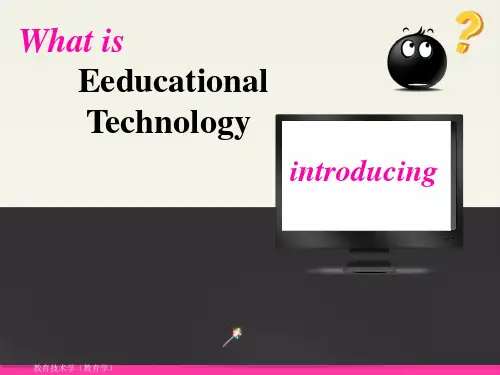
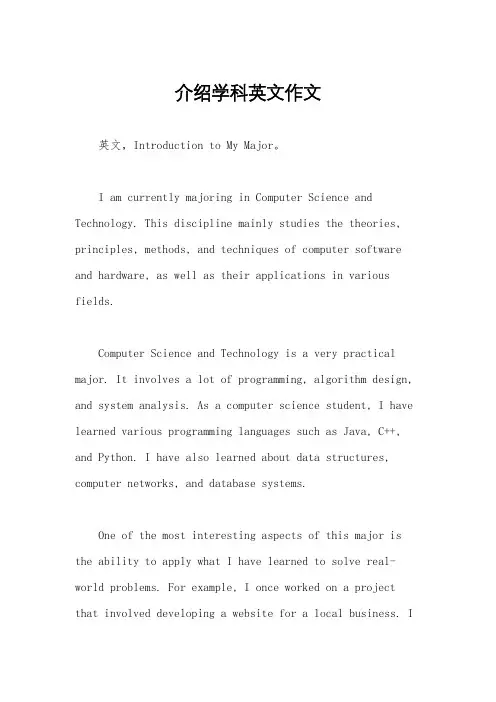
介绍学科英文作文英文,Introduction to My Major。
I am currently majoring in Computer Science and Technology. This discipline mainly studies the theories, principles, methods, and techniques of computer software and hardware, as well as their applications in various fields.Computer Science and Technology is a very practical major. It involves a lot of programming, algorithm design, and system analysis. As a computer science student, I have learned various programming languages such as Java, C++, and Python. I have also learned about data structures, computer networks, and database systems.One of the most interesting aspects of this major is the ability to apply what I have learned to solve real-world problems. For example, I once worked on a project that involved developing a website for a local business. Iwas responsible for designing the user interface and implementing the backend logic. It was a challenging project, but it was also very rewarding to see the final product in action.Overall, I am very passionate about my major and I believe that it has a bright future. With the continuous development of technology, there will always be a need for people who understand how to design and develop software.中文,介绍我的专业。

电气工程及其自动化专业英语介绍Introduction:Electrical Engineering and its Automation is a field of study that combines electrical engineering principles with automation techniques. This discipline focuses on the design, development, and implementation of electrical systems and their control using various automation technologies. In this article, we will delve into the various aspects of Electrical Engineering and its Automation, including its scope, key concepts, job opportunities, and future prospects.Body:1. Scope of Electrical Engineering and its Automation:1.1 Importance of Electrical Engineering:- Electrical engineering plays a vital role in various industries, including power generation, telecommunications, transportation, and manufacturing.- It involves the design and maintenance of electrical systems, such as power distribution networks, control systems, and electronic devices.1.2 Automation in Electrical Engineering:- Automation techniques are applied to enhance the efficiency, reliability, and safety of electrical systems.- Automation technologies, such as PLC (Programmable Logic Controller) and SCADA (Supervisory Control and Data Acquisition), are used for process control, monitoring, and data acquisition.1.3 Integration of Electrical Engineering and Automation:- The integration of electrical engineering principles with automation technologies enables the development of advanced control systems and intelligent machines.- It facilitates the automation of various industrial processes, leading to increased productivity and reduced human intervention.2. Key Concepts in Electrical Engineering and its Automation:2.1 Electrical Circuit Analysis:- This involves the study of electrical circuits and their behavior using mathematical models and techniques.- Concepts such as Ohm's law, Kirchhoff's laws, and circuit theorems are used to analyze and solve electrical circuit problems.2.2 Power Systems:- Power systems deal with the generation, transmission, and distribution of electrical energy.- Concepts like power generation, power factor correction, and power system protection are essential in ensuring a stable and reliable power supply.2.3 Control Systems:- Control systems involve the regulation and control of electrical processes.- Concepts like feedback control, PID (Proportional-Integral-Derivative) controllers, and system stability are crucial in designing and implementing control systems.3. Job Opportunities in Electrical Engineering and its Automation:3.1 Electrical Engineer:- Electrical engineers are responsible for designing, developing, and maintaining electrical systems.- They work in various industries, including power generation, telecommunications, and manufacturing.3.2 Automation Engineer:- Automation engineers specialize in the design and implementation of automation systems.- They develop control strategies, program PLCs, and integrate automation technologies into electrical systems.3.3 Research and Development:- Electrical engineering and its automation offer numerous research and development opportunities.- Researchers work on developing innovative technologies and improving existing systems to meet the evolving demands of industries.4. Future Prospects in Electrical Engineering and its Automation:4.1 Renewable Energy:- The growing focus on renewable energy sources, such as solar and wind power, presents new challenges and opportunities in electrical engineering and its automation.- Engineers are needed to design and optimize renewable energy systems and integrate them into the existing power grid.4.2 Internet of Things (IoT):- The integration of electrical systems with IoT technologies opens up new avenues for automation and control.- Electrical engineers can leverage IoT to develop smart grids, intelligent buildings, and efficient energy management systems.4.3 Artificial Intelligence (AI):- AI techniques, such as machine learning and neural networks, can be applied to enhance the automation capabilities of electrical systems.- Electrical engineers can explore the use of AI for predictive maintenance, fault detection, and optimization of electrical processes.Conclusion:Electrical Engineering and its Automation is a dynamic field that combines electrical engineering principles with automation technologies. It plays a crucial role in various industries and offers a wide range of job opportunities. The integration of electrical engineering with automation enables the development of advanced control systems and intelligent machines. With the increasing focus on renewable energy, IoT, and AI, the future prospects in this field are promising. As technology continues to advance, electrical engineering and its automation will continue to evolve, driving innovation and shaping the future of industries.。
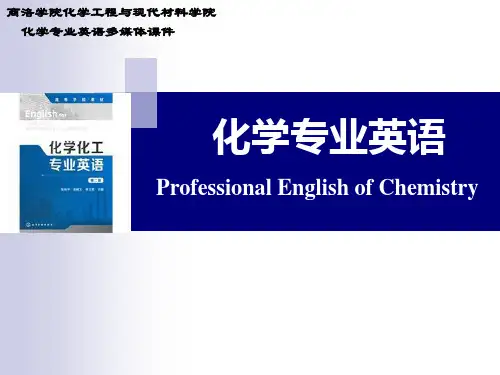
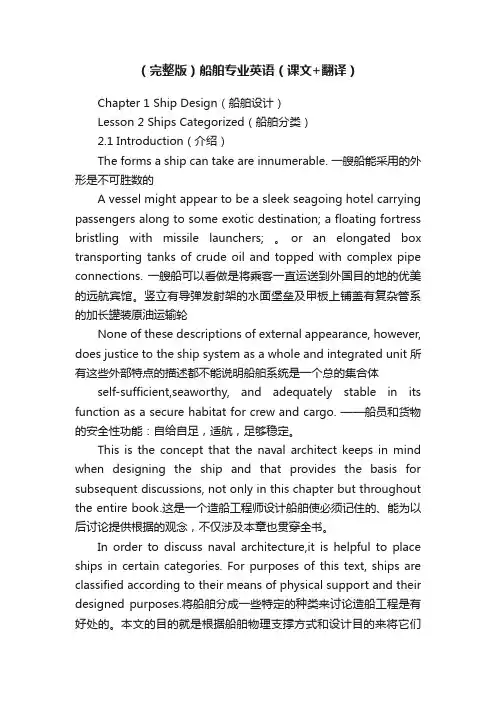
(完整版)船舶专业英语(课文+翻译)Chapter 1 Ship Design(船舶设计)Lesson 2 Ships Categorized(船舶分类)2.1 Introduction(介绍)The forms a ship can take are innumerable. 一艘船能采用的外形是不可胜数的A vessel might appear to be a sleek seagoing hotel carrying passengers along to some exotic destination; a floating fortress bristling with missile launchers; 。
or an elongated box transporting tanks of crude oil and topped with complex pipe connections. 一艘船可以看做是将乘客一直运送到外国目的地的优美的远航宾馆。
竖立有导弹发射架的水面堡垒及甲板上铺盖有复杂管系的加长罐装原油运输轮None of these descriptions of external appearance, however, does justice to the ship system as a whole and integrated unit所有这些外部特点的描述都不能说明船舶系统是一个总的集合体self-sufficient,seaworthy, and adequately stable in its function as a secure habitat for crew and cargo. ——船员和货物的安全性功能:自给自足,适航,足够稳定。
This is the concept that the naval architect keeps in mind when designing the ship and that provides the basis for subsequent discussions, not only in this chapter but throughout the entire book.这是一个造船工程师设计船舶使必须记住的、能为以后讨论提供根据的观念,不仅涉及本章也贯穿全书。
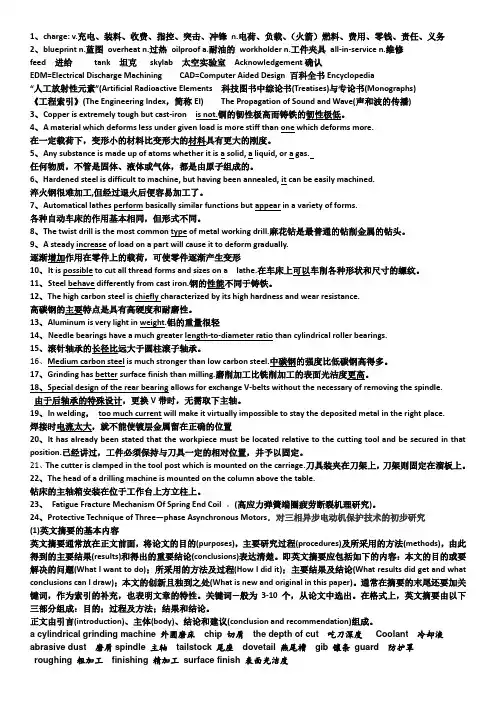
1、charge: v.充电、装料、收费、指控、突击、冲锋n.电荷、负载、(火箭)燃料、费用、零钱、责任、义务2、blueprint n.蓝图overheat n.过热oilproof a.耐油的workholder n.工件夹具all-in-service n.维修feed 进给tank 坦克skylab 太空实验室Acknowledgement确认EDM=Electrical Discharge Machining CAD=Computer Aided Design 百科全书Encyclopedia“人工放射性元素”(Artificial Radioactive Elements科技图书中综论书(Treatises)与专论书(Monographs)《工程索引》(The Engineering Index,简称EI)The Propagation of Sound and Wave(声和波的传播)3、Copper is extremely tough but cast-iron is not.铜的韧性极高而铸铁的韧性极低。
4、A material which deforms less under given load is more stiff than one which deforms more.在一定载荷下,变形小的材料比变形大的材料具有更大的刚度。
5、Any substance is made up of atoms whether it is a solid, a liquid, or a gas.任何物质,不管是固体、液体或气体,都是由原子组成的。
6、Hardened steel is difficult to machine, but having been annealed, it can be easily machined.淬火钢很难加工,但经过退火后便容易加工了。
7、Automatical lathes perform basically similar functions but appear in a variety of forms.各种自动车床的作用基本相同,但形式不同。

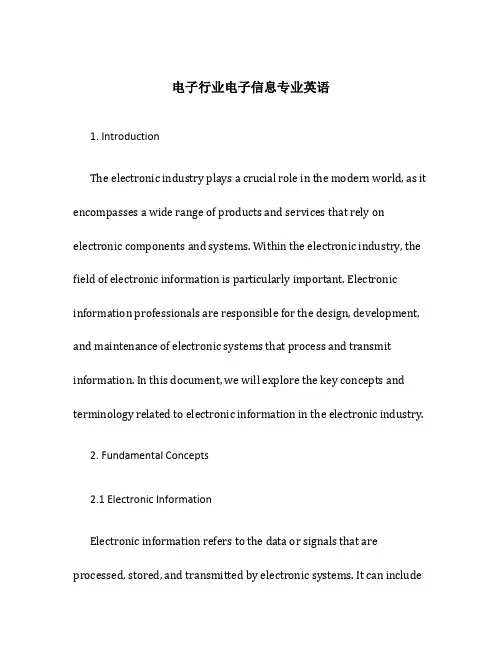
电子行业电子信息专业英语1. IntroductionThe electronic industry plays a crucial role in the modern world, as it encompasses a wide range of products and services that rely on electronic components and systems. Within the electronic industry, the field of electronic information is particularly important. Electronic information professionals are responsible for the design, development, and maintenance of electronic systems that process and transmit information. In this document, we will explore the key concepts and terminology related to electronic information in the electronic industry.2. Fundamental Concepts2.1 Electronic InformationElectronic information refers to the data or signals that are processed, stored, and transmitted by electronic systems. It can includevarious forms of media, such as text, images, audio, and video. Electronic information systems are designed to convert, manipulate, and transmit this information in a reliable and efficient manner.2.2 Electronic ComponentsElectronic components are the building blocks of electronic information systems. They are devices that can control the flow of electrons in a circuit and perform various functions, such as amplification, signal processing, and data storage. Examples of electronic components include resistors, capacitors, transistors, and integrated circuits.2.3 Electronic SystemsElectronic systems are composed of multiple electronic components that work together to perform a specific function. They can range from simple systems, such as a basic calculator, to complex systems, such as a computer or a smartphone. Electronic systems often consist ofinterconnected circuits and subsystems that enable the processing and transmission of electronic information.3. Key Terminology3.1 Analog and Digital SignalsAnalog signals are continuous signals that can take on any value within a certain range. They are commonly used to represent real-world phenomena, such as sound and light. Digital signals, on the other hand, are discrete signals that can only take on specific values, typically represented as 0s and 1s. They are used in digital electronic systems to represent and process information.3.2 MicrocontrollersMicrocontrollers are small, self-contained computers that are used to control electronic systems. They are often embedded in electronic devices to perform specific tasks, such as reading sensor data,controlling actuators, and executing algorithms. Microcontrollers typically have a CPU, memory, and input/output interfaces.3.3 Wireless CommunicationWireless communication refers to the transmission of electronic information without the use of physical cables or wires. It relies on electromagnetic waves to carry signals between electronic devices. Wireless communication technologies, such as Wi-Fi and Bluetooth, are widely used in various applications, including mobile devices, home automation, and industrial control systems.3.4 Circuit DesignCircuit design involves the creation and optimization of electronic circuits that perform specific functions. It includes selecting and connecting electronic components, designing PCB layouts, and analyzing circuit performance. Circuit design is crucial for ensuring the proper functioning and reliability of electronic systems.4. ConclusionIn conclusion, electronic information is a vital aspect of the electronic industry. Understanding the fundamental concepts and key terminology related to electronic information is essential for professionals working in this field. By familiarizing themselves with these concepts and terminology, electronic information professionals can effectively design, develop, and maintain electronic systems that process and transmit information in a reliable and efficient manner.。
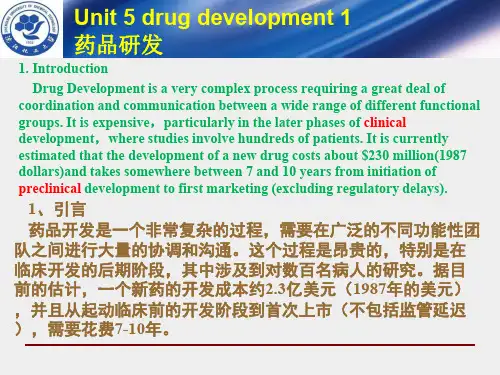
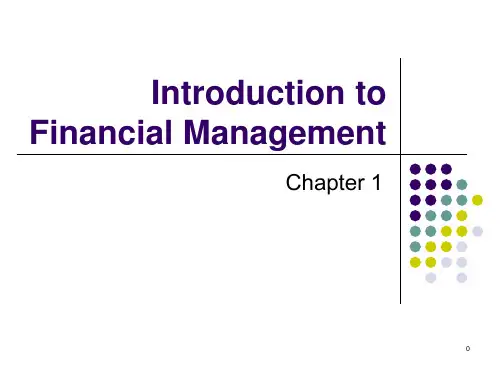
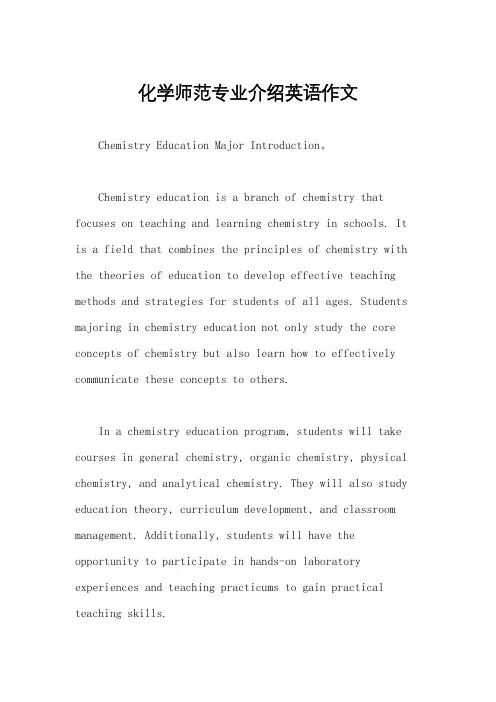
化学师范专业介绍英语作文Chemistry Education Major Introduction。
Chemistry education is a branch of chemistry that focuses on teaching and learning chemistry in schools. It is a field that combines the principles of chemistry with the theories of education to develop effective teaching methods and strategies for students of all ages. Students majoring in chemistry education not only study the core concepts of chemistry but also learn how to effectively communicate these concepts to others.In a chemistry education program, students will take courses in general chemistry, organic chemistry, physical chemistry, and analytical chemistry. They will also study education theory, curriculum development, and classroom management. Additionally, students will have the opportunity to participate in hands-on laboratory experiences and teaching practicums to gain practical teaching skills.One of the key goals of a chemistry education programis to prepare students to become effective chemistry teachers in middle schools, high schools, and colleges. Graduates of these programs are equipped with the knowledge and skills needed to create engaging and interactive lessons that help students understand and appreciate the concepts of chemistry. They are also trained to effectively assess student learning and provide feedback to help students improve their understanding of chemistry.In addition to teaching, graduates of chemistry education programs may also pursue careers in curriculum development, educational research, or science outreach. They may work for educational organizations, government agencies, or non-profit organizations to develop educational resources, conduct research on effective teaching practices, or promote science education in the community.Overall, a degree in chemistry education opens up a wide range of career opportunities for students who arepassionate about both chemistry and education. By combining their knowledge of chemistry with their teaching skills, graduates of these programs play a crucial role ininspiring the next generation of scientists and helping students develop a deeper understanding of the world around them.。
电子信息工程专业英语词汇(精选整理版)1. IntroductionThis document provides a curated collection of key vocabulary terms related to the field of Electronic Information Engineering. It aims to assist students and professionals in their understanding and use of English terminology in this domain.2. Key Vocabulary Terms- Digital signal processing (数字信号处理)- Semiconductor device (半导体器件)- Electromagnetic wave (电磁波)- Microelectronics (微电子学)- Integrated circuit (集成电路)- Wireless networks (无线网络)- Optoelectronics (光电子学)- Signal transmission (信号传输)- Information theory (信息论)- Digital image processing (数字图像处理)- Electronic circuit design (电子电路设计)- Microprocessor technology (微处理器技术)- Power electronics (功率电子学)- Network security (网络安全)- Control systems (控制系统)3. Conclusion(Note: Please note that the translations provided are for reference purposes and may vary in different contexts. It is always advisable to consult reliable sources for accurate translations and further clarification.)。
介绍专业的英语作文Introduction to My Major。
As a student majoring in Computer Science and Technology, I would like to introduce my major to you. Computer Science and Technology is an interdisciplinary subject that combines computer science, mathematics, and engineering. It mainly studies the theory, design, development, and application of computer software and hardware.Firstly, the core courses of Computer Science and Technology include programming language, data structure, algorithm analysis, computer organization and architecture, operating system, database, computer network, and software engineering. These courses provide students with a solid foundation in computer science and technology, and help them to develop the ability to solve practical problems using computer technology.Secondly, Computer Science and Technology has a wide range of applications in various fields, such as finance, healthcare, transportation, education, entertainment, and so on. For example, in finance, computer technology is used to analyze and manage financial data, to develop trading algorithms, and to provide online financial services. In healthcare, computer technology is used to develop medical imaging systems, to analyze medical data, and to provide telemedicine services. In transportation, computer technology is used to develop intelligent transportation systems, to optimize traffic flow, and to provide ride-sharing services. In education, computer technology is used to develop online learning platforms, to provide personalized learning experiences, and to support distance education.Thirdly, Computer Science and Technology is a fast-growing field with many opportunities for career development. Graduates with a degree in Computer Science and Technology can work in various industries, such as IT, finance, healthcare, transportation, education, and so on. They can work as software engineers, system analysts,database administrators, network administrators, cybersecurity specialists, data scientists, and so on. They can also work in research and development, teaching, and entrepreneurship.In conclusion, Computer Science and Technology is a fascinating and rewarding major that provides students with a solid foundation in computer science and technology, a wide range of applications in various fields, and many opportunities for career development. If you are interested in computer technology and want to make a difference in the world, Computer Science and Technology is definitely a good choice for you.。
机械专业英语1. Introduction机械工程是一门涉及机械设备和工具设计、制造、使用和维护的学科,是工程技术领域中的一个重要分支。
机械专业英语是机械工程学习中必不可少的一部分,它涉及到机械工程师需要掌握的英语词汇、专业术语、文档阅读和撰写技巧等方面。
本文将介绍一些常用的机械专业英语词汇和常用的表达方式,以帮助读者更好地掌握机械专业英语。
2. Mechanical Engineering Vocabulary以下是一些常用的机械工程专业词汇,可以帮助读者对机械工程领域的基本概念有更好的了解:•Mechanical Engineering(机械工程): A discipline of engineering that deals with the design, construction, and operation of machinery.•Engineer(工程师): A person who designs, builds, or maintains engines, machines, or public works.•CAD(计算机辅助设计): Computer-Aided Design, a software tool used by engineers to create and modifymechanical designs.•CAM(计算机辅助制造): Computer-Aided Manufacturing, a software tool used to controlmanufacturing processes.•CNC(计算机数控): Computer Numerical Control,a method of controlling manufacturing machines usingcomputers.3. Common Expressions in Mechanical Engineering在机械工程领域,有一些常用的表达方式,以下是一些示例:•According to the design specifications(根据设计规范): Indicates that something is done in accordance with the design requirements.•The machine is in operation(机器正在运行): Indicates that the machine is currently running andperforming its intended function.•The material is heat-treated(材料经过热处理): Indicates that the material has undergone a specific heat treatment process for improved properties.•The system is experiencing mechanical failure(系统发生机械故障): Indicates that the system is notfunctioning properly due to a mechanical issue.•The component needs to be lubricated regularly(零部件需要定期加润滑油): Indicates that regularlubrication is required to ensure proper functioning of the component.4. Reading and Writing Documents in Mechanical Engineering在机械工程领域,阅读和撰写文档是非常重要的技能。
介绍我的专业英语作文Introduction to My Major。
As a student majoring in English, I have always been passionate about language and communication. English is a global language that is spoken by millions of people around the world, and it is a crucial tool for international communication, business, and diplomacy. In this essay, I will introduce my major in English, including its significance, the skills and knowledge I have acquired, and my future career prospects.First and foremost, studying English has provided me with a deep understanding of the language and its cultural significance. Through my coursework, I have learned about the history of the English language, its development and evolution, and its impact on literature, politics, and society. I have also honed my language skills, including reading, writing, speaking, and listening, which are essential for effective communication in English-speakingenvironments.In addition to language proficiency, my major has equipped me with critical thinking and analytical skills. In my literature and cultural studies classes, I have learned to analyze and interpret complex texts, to understand the historical and cultural contexts in which they were produced, and to critically evaluate different perspectives and interpretations. These skills are not only valuable for academic research and writing, but also for a wide range of professional fields, including journalism, publishing, and education.Furthermore, my major has provided me withopportunities for personal and intellectual growth. Through studying English literature, I have been exposed to a diverse range of ideas, perspectives, and experiences, which have broadened my worldview and deepened my empathy and understanding of others. I have also had the opportunity to develop my creativity and self-expression through writing and literary analysis, which has been immensely rewarding and fulfilling.Looking ahead, I am excited about the career prospects that my major in English offers. With my language skills, critical thinking abilities, and cultural knowledge, I am well-prepared for a variety of professional paths. I am considering pursuing a career in translation, teaching, or international business, where my English proficiency and cross-cultural understanding will be valuable assets. I am also open to the possibility of furthering my studies in English literature or linguistics, as I am passionate about deepening my knowledge and contributing to the field.In conclusion, my major in English has been a rich and rewarding experience that has provided me with valuable skills, knowledge, and personal growth. I am confident that my proficiency in English, my critical thinking abilities, and my passion for language and culture will open up exciting opportunities for me in the future. I am grateful for the education and experiences that my major has provided me, and I am excited about the possibilities that lie ahead in my career.。
介绍专业英语的作文Professional English Introduction。
Professional English is a specialized form of English used in specific fields such as business, medicine, law, and engineering. It is essential for professionals to communicate effectively and accurately within their respective industries, and professional English provides the necessary language skills to do so.In the business world, professional English is crucial for successful communication with clients, colleagues, and business partners. It includes the use of formal language, industry-specific terminology, and professional etiquette. For example, a business professional may need to write formal emails, create presentations, and negotiate contracts using professional English.In the medical field, professional English is essential for doctors, nurses, and other healthcare professionals tocommunicate with patients, colleagues, and medical staff.It involves using medical terminology, writing patient reports, and discussing treatment options in a clear and concise manner.Similarly, in the legal field, professional English is necessary for lawyers, paralegals, and legal professionals to draft legal documents, communicate with clients, and present cases in court. It requires a deep understanding of legal terminology, as well as the ability to convey complex legal concepts in a clear and persuasive manner.In the field of engineering, professional English is vital for engineers, project managers, and technical professionals to communicate with clients, vendors, and team members. It involves using technical jargon, writing technical reports, and presenting engineering solutions in a professional and precise manner.Overall, professional English is a specialized form of language that enables professionals to communicate effectively and accurately within their specific fields. Itrequires a deep understanding of industry-specific terminology, as well as the ability to convey complex concepts in a clear and professional manner.In conclusion, professional English is an essentialskill for professionals in various fields such as business, medicine, law, and engineering. It allows them to communicate effectively and accurately within their respective industries, using industry-specific terminology and professional etiquette. Mastering professional English is crucial for success in the professional world, and it is a skill that can be developed through practice, study, and immersion in the specific field of work.。